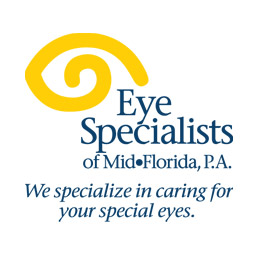Posted by: Eye Specialists of Mid Florida in Blog

Cataracts are a common point of discussion during eye examinations, simply because everyone will eventually develop them, and nearly everyone will require cataract surgery in their lifetime. To understand what a cataract is, it is first important to understand a bit about the anatomy of the eye. Within the eye, behind the iris (the colored portion of the eye) lies a structure called the crystalline lens. This lens serves to focus the light rays entering the eye to allow good vision. As we age, the fibers of this lens begin to change, and its optical clarity is lost. This clouded, hazy lens is called a cataract.
Those with cataracts may feel as though they are constantly looking through a dirty window. General clarity is reduced and perception of colors may become muted or “washed out”. Halos and glare from lights—especially during tasks like nighttime driving—are often the first symptoms reported and become increasingly bothersome. As cataracts worsen, glasses or contact lenses become less effective at correcting vision. When a patient’s quality of life is sufficiently affected or daily tasks become difficult, cataract surgery is offered as a solution. The procedure involves removing the opacified lens and implanting an artificial lens—made of an acrylic or plastic material—in its place. This restores the optical clarity of the system, and visual outcomes are typically excellent. We stress the importance of regular eye exams, this allows for the detection of cataracts as they develop, and enables us to form an effective treatment plan as they progress.
With the Fourth of July festivities quickly approaching, it is important to consider a few important tips regarding fireworks safety. Remember that fireworks are more than just loud bangs and pretty colors—they are explosives capable of inflicting serious injury. Every year, thousands of Americans are injured by either by handling fireworks improperly or by being an unlucky bystander. A recent Consumer Product Safety Commission report found that about 14% of these cases were eye related. Shrapnel and emissions from even the smallest fireworks can be devastating to delicate eye tissues, causing thermal and chemical burns, corneal lacerations, or in worse cases even rupture the globe of the eye. These can lead to permanent, irreversible vision loss or even blindness.
We urge everyone to stay safe during their celebrations this year. Of course, the simplest and truly safest course of action is to forgo the use of personal fireworks and instead leave it to professionals. However, if you simply must use your own, please ensure to proper follow precautions and to review the manufacturer’s handling instructions and safety information. In the event of any fireworks-related eye injury, it should be treated as a medical emergency. Seek care from the emergency room immediately, and do not attempt to rinse the eye or remove any debris, and refrain from rubbing or applying pressure to the eyes. All of us at Eye Specialists of Mid-Florida wish you a happy and safe Fourth of July!

By: Daniel Smith, O.D.
